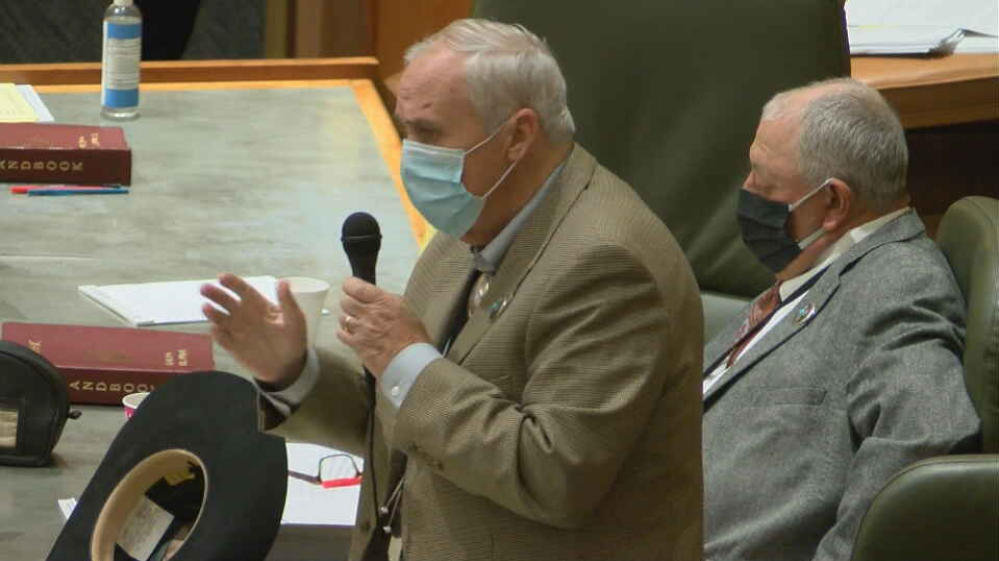Background
On January 27, the House Health and Human Services Committee held a hearing on House Bill 7. The bill is titled “Repeal of Abortion Ban.” It refers to a relatively weak “prohibition” law passed by the New Mexico Legislature in 1969 and signed by moderate Republican Governor Dave Cargo. (* See the explanation of why it is a relatively weak law in the footnotes below.)
The law, of course, is invalid, having been superseded and rendered obsolete by the US Supreme Court ruling in Roe v. Wade four years later.
However, it is important to keep in mind that there are quite a number of existing statutes or even Constitutional provisions, not just in New Mexico, but in all states, that have been made ineffective or of no consequence because of case law that has invalidated those very laws. Sometimes states go through the process of amending or removing the state statutes; sometimes they don’t. There is no imperative to do so.
As an example, for 45 years following passage of the 26th Amendment that lowered the voting age to 18, the New Mexico State Constitution continued to “require” voters to be 21. It also required voters to have resided in the state, county, and precinct for 12 months, 90 days, and 30 days respectively, despite having those requirements struck down by the Supreme Court. (All the all the above were repealed by voters in 2016.)
The point is that state legislative action on “unconstitutional” laws or laws made ineffectual by case law is not mandatory. That cannot be used as a rationale for casting a vote.
The Committee Vote and Reaction
The committee vote was 8 to 3 in support of repealing the so-called "abortion ban"— New Mexico's law that was passed four years before Roe v. Wade. GOP Representative Phelps Anderson of Roswell joined seven Democrats voting to repeal the ban. Three other Republicans voted “no," to keep the prohibition on the books.
Representative Anderson told us he was very impressed with the testimony at the hearing and that it really had an impact, making him think and reflect on the issue.
The response has been something of a firestorm from Republicans, many of whom have called for Anderson to resign. Anderson represents Chaves, Lea, and Roosevelt Counties, and the GOP chairs for Lea and Roosevelt have asked him to resign.
We asked if he was going to do that. He responded,
“Unless I’m wrong, it’s my call. I am not going to resign. I am not a quitter.”
When we asked if he would run again, Anderson replied:
“I don’t know about that. Filing date is a year away. But if I had to answer right now, I’d say no.’”
Representative Anderson added that the bill was “going to pass anyway.” But of course, that is never a good reason to vote for anything. Tie votes, or one-vote margins are relatively rare in legislative roll calls.
What this means is that 97% of the time, or more, any bill is going to be passed or defeated “anyway” regardless of how one votes.
What constituents expect, and what everyone should do, is vote for what one believes is correct, right, or just. It doesn’t matter if the vote is 8 to 3, 7 to 4, or 10 to 1. Or for that matter 69 to 1 on the floor of the House.
So, any mention of an ultimate outcome is really irrelevant. One must do the right thing at all times. We can only presume that Representative Anderson did what he thought was right for him.
Abandoning the Republican Party
The reaction was so strong that Anderson surprised everyone in his hometown of Roswell by publicly announcing that he was leaving the Republican Party.
“I decided to re-register as a Decline to State. People ask if I can win a primary, well, that’s not a question that has to be asked because I’m no longer in the Republican Party.”
His decision to re-register was surprising because Anderson has a lifelong pedigree as a prominent member of the Republican Party. His father, the late Robert O. Anderson, had been a pioneer member of the Chaves County GOP, and Phelps followed in his footsteps, serving in the State House of Representatives from 1976 to 1980, then serving the Republican National Committee as New Mexico’s National Committeeman from 1988 to 1996.
We asked why leave the Republican Party. His answers took us by surprise:
"I've been I’ve been very disappointed with the Republican Party. In particular, the events of January 6th were just so disappointing that they led me to consider re-registering as DTS. I’m demoralized by my party. Their defense of January 6th was just so disappointing.”
 We found this to be more or less stunning, and pushed back by pointing out that we could find no Republicans who in any way justified the January 6th riots. In fact, we pointed out, every single Republican we have seen or read about has denounced the violence. (In fact, it is the Democrats who have not denounced the widespread violence that has taken place for nearly a year.)
We found this to be more or less stunning, and pushed back by pointing out that we could find no Republicans who in any way justified the January 6th riots. In fact, we pointed out, every single Republican we have seen or read about has denounced the violence. (In fact, it is the Democrats who have not denounced the widespread violence that has taken place for nearly a year.)
But Anderson pushed back on our pushback:
“I disagree with that. There’s lots of political spin about what happened on January 6th. There’s lots of video imagery. I disagree with what happened on that day and will always disagree with it. Trump encouraged that mob. People were killed inside the building. It just tears me up that that’s my party.”
So, what to think about all of this? Has Anderson, like lots of Americans, Reacted Emotionally to Recent Events
Anderson admitted that he’s always found the abortion question to be a troubling and difficult one, telling us that he’s “always voted pro-life on bills that have come up,” but admitting that he has struggled with the issue in general.
Not openly stated, but certainly broadly hinted, it is likely that Representative Anderson has always been pro-choice at heart. We discussed that matter. He is clearly uncomfortable with the GOP’s pro-life platform, but he has lived with it. Till now.
What pushed him over the edge? It clearly has a lot to do with the riots of January 6th. But in that regard, Rep. Anderson sounds more like the media talking heads than a dispassionate observer. Anderson says, “People were killed inside the building.”
Let’s look at the facts about that. Who was killed?
Five People died on January 6th
None of what happened in the invasion of the Capitol by the mob is in anyway excusable. All those who violated the law should be prosecuted and sentenced to jail. The rioters were, and remain, idiots. There is no way any of that is attributable to the Republican Party.
To do so is an emotion-based, media-inspired reaction.
But was anyone actually killed?
Yes. One person: A Trump supporter, 35-year-old Ashli Babbitt, a military veteran from San Diego. She was unarmed. But she was shot as she tried to crawl through a broken window.
That’s all we know. Authorities have refused to release the name of the man who shot her explain why she was shot. We may never know the answer to why her life was taken from her.
Four Other People Died, but none was “killed.”
Rosanne Boyland, a 34-year-old woman from Georgia. Authorities say she died of a “medical emergency.” Some have said she “may have been trampled accidentally.”
Kevin Greeson, a 55-year-old who had a history of high blood pressure. His wife said “In the midst of the excitement, he suffered a heart attack."
Benjamin Phillips, 50 years old. He died of a stroke. But he apparently died outside on the grounds of the Capitol and never entered the building.
Brian Sicknick, a 42-year-old Capitol police officer. His union chief announced that he “died of a stroke.” Media reports have falsely stated, many times, that he was “beaten to death with a fire extinguisher.” But this is simply not true. He was not beaten with a fire extinguisher or anything else. No one knows where this story came from.
The lie about the beating led to the Democrats having Officer Sicknick lie in state at the Capitol, where Democrats (who are relentless critics of the police, calling them “racist” for the past year) made a histrionic scene of solemnly streaming past his body—used essentially as a prop—to build an emotional case for their impeachment case. They finally found a police officer they could use for political purposes.
But he wasn’t killed by anyone. He died of a stroke. And there was no evidence of any kind of trauma. For whatever reason, he was immediately cremated, and his autopsy has been sealed.
The Bottom Line
Representative Phelps Anderson is a sophisticated, educated, thoughtful person who has wanted to serve in political office and has done so in a conscientious way. He is a gentleman and gregarious, friendly man.
The reality is that, as all human beings’ life experiences change them over time—none of us is static, unchanging, or unaffected by our experiences—Rep. Anderson has probably been, perhaps unconsciously, both culturally and socially disaffected with and alienated from the Republican Party for a number of years.
The committee meeting simply brought clarity to his current thinking. It became a moment of decision and he made that decision.
*As US abortion prohibition laws go, the New Mexico law is relatively “moderate,” in that it provides for all manner of exceptions—not only in the cases of rape, incest, or life of the woman, but it also contains provisions that permit abortion when the woman or her parent or guardian asserts that the pregnancy is likely to result in “grave impairment of the physical or mental health of the woman” or the child will probably “have a grave physical or mental defect.”
Nonetheless, pro-abortion advocates have long been irritated by the law, and with the election the hard-Left Governor Grisham in 2018, they have been champing at the bit to repeal the law
In other words, the reality is, even if there had never been a ruling in Roe v. Wade, abortion would not really be prohibited in New Mexico. The provisions of the law were such that abortion could not actually be prevented, provided the woman wanted an abortion and is able to obtain written certification from a special hospital board to back up her request.
The New Mexico Statute in Question
30-5-3. Criminal abortion.
Criminal abortion consists of administering to any pregnant woman any medicine, drug or other substance, or using any method or means whereby an untimely termination of her pregnancy is produced, or attempted to be produced, with the intent to destroy the fetus, and the termination is not a justified medical termination.
Whoever commits criminal abortion is guilty of a fourth degree felony. Whoever commits criminal abortion which results in the death of the woman is guilty of a second degree felony.
“Justified medical termination" means the intentional ending of the pregnancy of a woman at the request of said woman or if said woman is under the age of eighteen years, then at the request of said woman and her then living parent or guardian, by a physician licensed by the state of New Mexico using acceptable medical procedures in an accredited hospital upon written certification by the members of a special hospital board that:
(1) the continuation of the pregnancy, in their opinion, is likely to result in the death of the woman or the grave impairment of the physical or mental health of the woman; or
(2) the child probably will have a grave physical or mental defect; or
(3) the pregnancy resulted from rape, as defined in Sections 40A-9-2 through 40A-9-4 NMSA 1953. Under this paragraph, to justify a medical termination of the pregnancy, the woman must present to the special hospital board an affidavit that she has been raped and that the rape has been or will be reported to an appropriate law enforcement official; or
(4) the pregnancy resulted from incest;
Email us (at editor@newmexicopoliticaljournal.com) with your feedback, comments, questions, and ideas.
Intelligent Political Discourse—for the Thoughtful New Mexican
.jpg)
